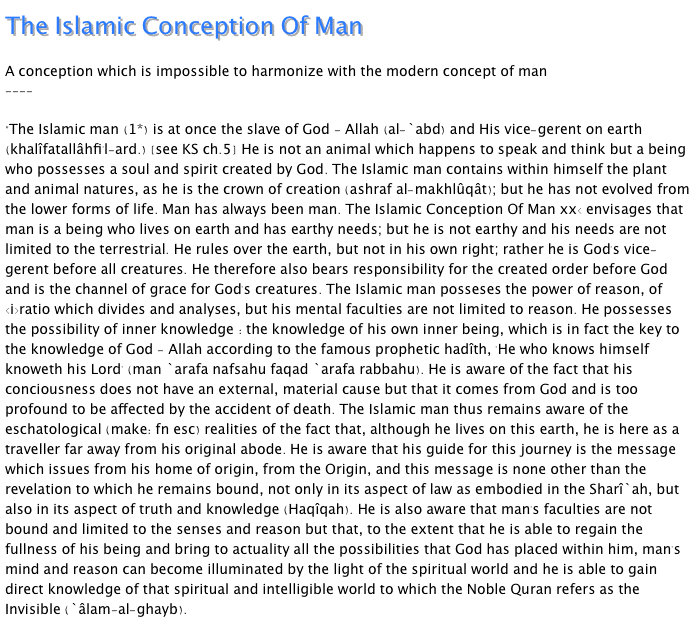
Edit OmarKN
-
The Islamic man[1] is at once the slave of God - Allah (al-‘ abd) and His vice-gerent on earth (khalifat-allah fil-ard)[2]. He is not an animal which happens to speak and think but a being who possesses a soul and spirit created by God.
The Islamic man contains within himself the plant and animal natures, as he is the crown of creation (ashraf al-makhluqat); but he has not evolved from the lower forms of life. Man has always been man.
The Islamic Conception of Man envisages that man is a being who lives on earth and has earthy needs; but he is not earthy and his needs are not limited to the terrestrial. He rules over the earth, but not in his own right; rather he is God's vicegerent before all creatures. He therefore also bears responsibility for the created order before God and is the channel of grace for God's creatures.
The Islamic man posseses the power of reason, of ratio, which divides and analyses, but his mental faculties are not limited to reason. He possesses the possibility of inner knowledge : the knowledge of his own inner being, which is in fact the key to the knowledge of God - Allah according to the famous prophetic hadith, "He who knows himself knoweth his Lord" (man `arafa nafsahu faqad `arafa rabbahu).
He is aware of the fact that his conciousness does not have an external, material cause but that it comes from God and is too profound to be affected by the accident of death.
The Islamic man thus remains aware of the eschatological [3] realities of the fact that, although he lives on this earth, he is here as a traveller far away from his original abode. He is aware that his guide for this journey is the message which issues from his home of origin, from the Origin, and this message is none other than the revelation to which he remains bound, not only in its aspect of law as embodied in the Shari`ah, but also in its aspect of truth and knowledge (Haqiqah).
He is also aware that mans faculties are not bound and limited to the senses and reason but that, to the extent that he is able to regain the fullness of his being and bring to actuality all the possibilities that God has placed within him, man's mind and reason can become iltuminated by the light of the spiritual world and he is able to gain direct knowledge of that spiritual and intelligible world to which the Noble Quran refers as the Invisible (`alam-al-ghayb).
Text as image

"In any case, what Westerners call civilization, the others would call barbarity, because it is precisely lacking in the essential, that is to say, a principle of a higher order."
René Guénon, East And West, 1924
صلّى الله على سيّدنا محمّد و على آله و صحبه و سلّم
The blessings and peace of Allah on the Prophet, his Family, and his Companions, ( sallAllahu `aleihi wa sallam ) .


Related
![]()
Author is probably S H Nasr, the book is unknown for now. ↩
see KS (Knowledge of the Sacred S H Nasr)ch.5
Man, Pontifical and Promethean
The concept of man as the pontiff, pontifex, or bridge between Heaven and earth, which is the traditional view of the anthropos [from Greek anthrōpos human being], lies at the antipode of the modern conception of man which envisages him as the Promethean earthly creature who has rebelled against Heaven and tried to misappropriate the role of the Divinity for himself. Pontifical man, who, in the sense used here, is none other than traditional man, lives in a world which has both an Origin and a Center. He lives in full awareness of the Origin which contains his own perfection and whose primordial purity and wholeness he seeks to emulate, recapture, and transmit. …
Promethean man, on the contrary, is a creature of this world. He feels at home on earth, earth not considered as the virgin nature which is itself an echo of paradise, but as the artificial world created by Promethean man himself in order to make it possible for him to forget God and his own inner reality. Such a man envisages life as a big marketplace in which he is free to roam around and choose objects at will.
Having lost the sense of the sacred, he is drowned in transience and impermanence and becomes a slave of his own lower nature, surrender to which he considers to be freedom. He follows passively the downward flow of the cycle of human history in which he takes pride by claiming that in doing so he has created his own destiny. …
↩
eschatology: the part of theology concerned with death, judgement, and the final destiny of the soul and of humankind.
↩